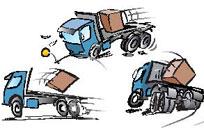Properly securing loads prevents injuries to people, damage to vehicles and property, and congestion due to lost cargo.
Cargo that hasn't been properly secured can fall off, affect the balance of a vehicle and sometimes even tip it over and cause accidents with other vehicles. Up to 25% of truck accidents are linked to poorly secured cargo. EU countries have different rules on this, making it hard for transporters to know the minimum requirements for journeys covering several countries.
The EU has therefore produced guidelines on cargo securing.
Abnormal loads
The EU has laws on the maximum weights and dimensions allowed for road freight. Loads that surpass the limits – referred to as “abnormal loads” – require special permits from regional or national authorities. Different countries have different rules and procedures for obtaining these permits – concerning vehicle escorts, allowed time frames, authorised speeds, etc. That makes things complicated for transport companies
The EU has therefore produced guidelines on abnormal loads .
Dangerous goods
There are also EU rules for cargo containing dangerous goods.
These include specific rules that are laid down in the UN agreement on international carriage of dangerous goods by road, covering aspects such as:
- classification , packaging and labelling of dangerous goods
- construction, equipment and operation of the vehicle
Legislation
- EU directive 96/53/EC – maximum dimensions and weights for road traffic
- EU directive 2002/7/EC – amending directive on maximum dimensions and weights for road traffic
- EU directive 2008/68/EC – inland transport of dangerous goods
- EU decision 2009/240/EC – exemptions from the directive on inland transport of dangerous goods
- EU directive 95/50/EC – uniform checks on dangerous goods haulage
- EU directive 2001/26/EC – amending the directive on uniform checks on dangerous goods haulage
- EU directive 2004/112/EC – updating the directive on uniform checks on dangerous goods haulage –
- EU directive 1999/36/EC – transportable pressure equipment
- Proposed amendment to Directive on transportable pressure equipment (COM(2009)482 final) .

